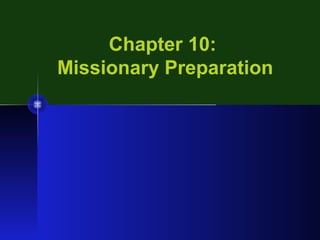
13 chapter10
- 2. Chapter Outline • Introduction • Why Get Training? • What Is the Goal of Training? • Training in Character Traits • Training in Ministry and Professional Skills • Training in Specialized Knowledge • Training in Social Skills • Types of Training Available • Conclusion
- 3. Why Get Training? Anytime a person gets ready to do a specialized task, training can help make the task easier and enable the person who is trained to do a better job than one who is not. Missionary preparation is no different. The reality of crossing into a new culture and bringing a message that may not make sense to a group of people whose language and ways of life the missionary neither knows nor understands is a complex task.
- 4. What Is the Goal of Training? • Genuine growth toward spiritual maturity • The ability to carry out one’s assigned task • The ability to interact well with people in the new cultural setting • The ability to adjust well by coping effectively with culture stress and dealing with the adaptation process
- 5. What Is the Goal of Training? (cont.) • The ability to facilitate adjustment and manage stress for family and significant others • The ability to develop genuine partnerships with national Christians in which both parties have something to offer to each other
- 6. Training in Character Traits • What Character Traits? • Spiritual Character Traits • Other Character Traits • Spiritual Disciplines to Develop These Traits
- 7. What Character Traits? Character traits are those qualities that characterize how a person sees the world, responds to varying circumstances, and is oriented to life.
- 8. Spiritual Character Traits • Genuine dependence on God • Humility and teachability • The fruit of the Spirit
- 9. Other Character Traits • More emphasis on people, less on task • Ability to withhold unproductive criticism • Tolerance of ambiguity and flexibility • Empathy • Openness in communication style • High cognitive complexity • Good personal relational skills in the home culture • Perseverance
- 10. Spiritual Disciplines to Develop These Traits • These traits are developed through spiritual disciplines, especially deep immersion in the Word of God through • study, • memorization, • meditation, • prayer, and • praising and thanking God in all circumstances. • Being mentored by a person or community is important.
- 11. Training in Ministry and Professional Skills • What Ministry Skills? • What Professional Skills? • How Can You Develop These Skills?
- 12. What Ministry Skills? • Skills for all Christians: • Discipling • Ability to build good relationships • Leadership development • Delegating skills • Mentoring skills • Be prepared to develop new skills on the field.
- 13. What Professional Skills? • Tentmaking missionaries do their jobs best when they have high-quality training and they are linked with people in the field who have the necessary ministry skills to follow up on contacts that the tentmaker provides.
- 14. What Professional Skills? (cont.) • Professional skills that are helpful in a variety of cross-cultural settings include: • Health • Engineering • Computer (hardware and software) • Specialized teaching such as TESOL • Writing (e.g., journalism) • Business
- 15. How Can You Develop These Skills? • Get involved in ministry now; don’t wait to get on the field. • When available, professional apprenticeships can be very valuable. • Seek appropriate educational work for your chosen professional field.
- 16. Training in Specialized Knowledge • What Knowledge? • How Can You Develop This Knowledge?
- 17. What Knowledge? • General knowledge that enables a person to understand how and why cultures differ • Culture-specific knowledge—including the specific social skills necessary to develop good relationships within a particular culture
- 18. How Can You Develop This Knowledge? • General knowledge: • Social science disciplines • Cross-cultural institutes • Perspectives course • Specific knowledge: • Find a pocket of people from your anticipated ministry setting and begin ministry now. • Enroll in on-site language programs. • Find mentors in your location of service.
- 19. Training in Social Skills • What Social Skills? • How Can You Develop These Social Skills?
- 20. What Social Skills? • Critical social skills are required in the new culture, including (Bochner and Furnham 1986, 14–15): • Expressing attitudes, feelings and emotions, • Adopting the appropriate proxemic posture; • Understanding the gaze patterns of the people they are interacting with; • Carrying out ritualized routines such as greetings, leave-taking, self-disclosure, making or refusing requests; and • Asserting themselves.
- 21. How Can You Develop These Social Skills? • Intercultural communication courses • Training institutes on site • Mentoring on site • Attitude is helpful: recognize that as a newcomer you lack the basic social skills that everyone else in the culture takes for granted.
- 22. Types of Training Available • Home or Church • Perspectives courses • Mentoring and discipleship • If possible, ministering among a chosen people group at home
- 23. Types of Training Available (cont.) • Short-Term Institutes • Agape International Training (www.aitusa.org) • Center for Intercultural Training ( www.cit-online.org) • Mission Training International (www.mti.org) • Institute for Cross-Cultural Studies (www. wheaton.edu/bgc/icct/) • MissionPrep (www.timcentre.com/missionprep ) • Residential Educational Institutions
- 24. Conclusion While theological training has been available for centuries, formal mission training did not start until the second half of the nineteenth century. Though relatively new, many training opportunities offer high-quality preparation that will pave the way for a smoother cross-cultural adjustment and enable a more effective and enjoyable ministry experience. Today’s missionary cannot afford to move to a new culture without some type of pre-field training.